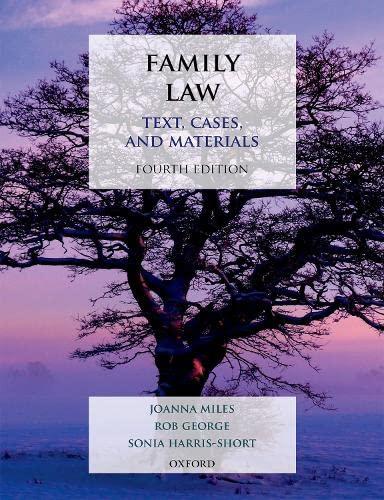Question
Reflection paper - Assignment 3 Choose topic 1 or 2 to reflection paper on. Be sure to include what you think. Reflection paper should be
Reflection paper - Assignment 3
Choose topic 1 or 2 to reflection paper on.
Be sure to include what you think.
Reflection paper should be two pages .
- The Broken Windows theory argues that neighbourhoods with prevalent vandalism, graffiti, open drunkenness, and panhandling create fear in a neighbourhood and embolden criminal activity. In the 1990s, New York City Police Commissioner Bill Bratton took a "broken windows" approach to tackling crime in New York. He ensured that police officers charged individuals for minor crimes, misdemeanours, and petty offences. The result was a dramatic decline in not just minor offences, but also in serious crime in the city. Critics, however, argue that this approach discriminates against the poor. Read the article below and reflection where you discuss and debate this approach. Which theory do you think explains this situation?
https://www.theatlantic.com/magazine/archive/1982/03/broken-windows/304465/
- Read the National Postarticle and view the embedded video: "Vancouver's 'gulag': Canada's poorest neighbourhood refuses to get better despite $1M a day in social spending." reflection on your thoughts about the issue and discuss what specific events lead to increases in crime rates in Vancouver's Downtown Eastside over the past 50 years. Which theory do you think explains this situation?
https://nationalpost.com/news/vancouvers-gulag-canadas-poorest-neighbourhood-refuses-to-get-better-despite-1m-a-day-in-social-spending
Tips for writing reflections:
Examples of Reflection Questions based on the "What? So What? Now What?"
What?
What happened? What did you observe?
What was your experience?
What was your intellectual and emotional response to the experience?
What issue is being addressed for course skills?
So What?
Did you learn a new skill or clarify an interest?
How is your experience different from what you expected?
What impacts the way you view the situation/experience? (What lens are you viewing from?) What did you like/dislike about the experience?
What did you learn that you can apply course outcomes?
What are some of the possibilities for you about yourself and your personal life?
Has the experience affected the way you view the world?
What did you do that seemed to be effective or ineffective in the community?
What sorts of things make you feel uncomfortable? Why?
Now What?
How can you apply this learning?
What would you like to learn more about, related to this project or issue? What follow-up is needed to address any challenges for your future profession and/or personal life?
What information can you share with your peers or the community?
Reflective writing in an academic context requires:
- Strong integration of course concepts (readings, lectures, and other materials).
- Personal reflection on how you are applying these concepts to your present and future career development.
What can I discuss in reflective writing?
- Your thoughts and ideas about the reading, lectures, and discussion in the course lectures, discussions and readings.
- Ideas about how your experiences relate to course ideas.
- Other reading that you have completed that relates to course ideas, but that presents them in a new or opposing way.
- Your learning process: as you have taken the course and discovered new concepts, how have you solved problems, reached new conclusions, and understood things in new ways?
- How do the ideas in the course challenge what you previously thought?
- Questions that you still have, and that you would like to continue to explore.
- How the course content can be understood in cross-cultural perspectives.
- What you need to explore next or learn more about.
- The actions that you plan to take as a result of what you are learning.
Step by Step Solution
There are 3 Steps involved in it
Step: 1

Get Instant Access to Expert-Tailored Solutions
See step-by-step solutions with expert insights and AI powered tools for academic success
Step: 2

Step: 3

Ace Your Homework with AI
Get the answers you need in no time with our AI-driven, step-by-step assistance
Get Started


